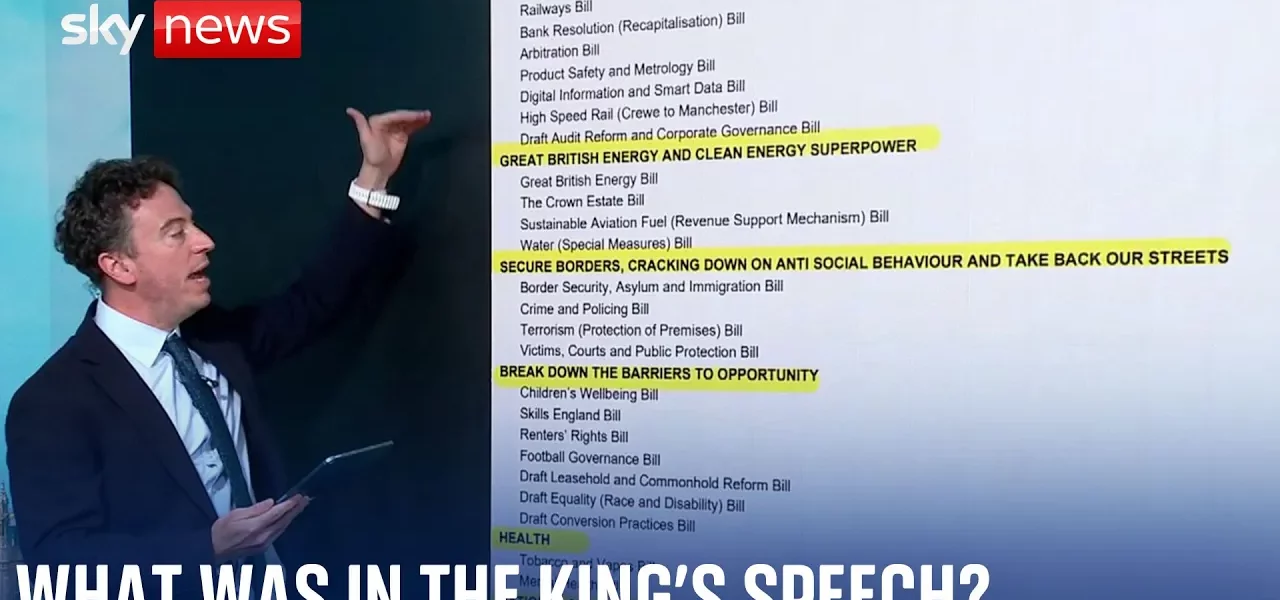The King Speech: A Comprehensive Analysis of Government’s Legislative Agenda

The King Speech serves as a crucial document outlining the government’s legislative agenda, revealing the direction in which policy-making is headed. This article delves into the main points highlighted in the speech, exploring the proposed bills and reforms aimed at shaping the future of the UK.
Introduction
The King Speech represents more than just a ceremonial address; it is a detailed exposition of the government’s intentions and priorities. With a total of 40 proposed bills, this year’s speech is indicative of a new government eager to establish its identity and implement significant changes. The focus areas include economic growth, green energy, national security, and healthcare, which collectively shape the narrative of the government’s agenda.
Overview of the King Speech
The King Speech can be likened to an antiquated press release that provides journalists and the public with insight into the government’s objectives. This year’s address is marked by several key themes:
- Economic Growth: Emphasis on fostering a stable economic environment.
- Green Energy: Initiatives aimed at enhancing the UK’s energy security and sustainability.
- National Health and Security: Strategies to bolster public health and safety.
Key Legislative Proposals
1. Planning and Infrastructure Bill
This bill aims to streamline the process of house building and improve local decision-making. Key components include:
- Facilitating compulsory purchases by the government.
- Increasing the number of planning inspectors available to local authorities.
- Enhancing infrastructure delivery mechanisms.
Interestingly, the anticipated mandatory housing target will not be included in this speech but is expected to appear in the National Policy Planning Framework later this year.
2. Employment Rights Bill
The Employment Rights Bill proposes significant enhancements to workers’ rights, focusing on:
- Improving trade union rights and rolling back previous restrictions.
- Introducing fair pay agreements, particularly in the adult social care sector, which could lead to higher wages for workers.
- Addressing issues such as parental leave and sick pay.
This bill is viewed as a transformational measure that could reshape the landscape of employment in the UK.
3. House of Lords Reform
Another significant proposal is the House of Lords Hereditary Peers Bill, which seeks to remove hereditary peers from the House of Lords. However, this bill does not address broader reforms that have been anticipated, such as:
- Introducing age limits for members.
- Potentially abolishing the House of Lords altogether.
Interpreting the King Speech
The King Speech offers a glimpse into the priorities of the new government, highlighting both immediate actions and long-term goals. Key observations include:
- Increased Role of Government: The proposals suggest a greater involvement of the state in various sectors, contrasting sharply with the previous conservative government’s approach.
- Focus on Draft Bills: Several significant bills are introduced as draft, indicating a slower approach to implementation, likely necessitating further consultation.
- Absence of Certain Issues: Notably, there is a lack of proposals regarding social care reform and the introduction of votes for 16 and 17-year-olds.
Conclusion
The King Speech represents a pivotal moment for the new government, outlining its legislative priorities and intended reforms. With a focus on growth, green energy, and workers’ rights, the government is positioning itself to make significant changes in the coming years. As we move forward, it will be essential to monitor the progress of the proposed bills and how they align with the government’s broader objectives. For further insights on UK politics and government reforms, explore our related articles on [Government Policies](#) and [Legislative Changes](#).
“`




